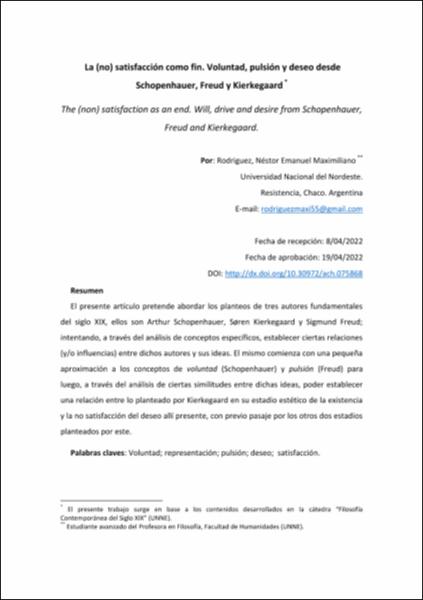La (no) satisfacción como fin. Voluntad, pulsión y deseo desde Schopenhauer, Freud y Kierkegaard
The (non) satisfaction as an end. Will, drive and desire from Schopenhauer, Freud and Kierkegaard
Fecha
2022-04Autor
Rodriguez, Néstor Emanuel Maximiliano
Metadatos
Mostrar el registro completo del ítemResumen
El presente artículo pretende abordar los planteos de tres autores fundamentales del siglo XIX, ellos son Arthur Schopenhauer, Søren Kierkegaard y Sigmund Freud; intentando, a través del análisis de conceptos específicos, establecer ciertas relaciones (y/o influencias) entre dichos autores y sus ideas. El mismo comienza con una pequeña aproximación a los conceptos de voluntad (Schopenhauer) y pulsión (Freud) para luego, a través del análisis de ciertas similitudes entre dichas ideas, poder establecer una relación entre lo planteado por Kierkegaard en su estadio estético de la existencia y la no satisfacción del deseo allí presente, con previo pasaje por los otros dos estadios planteados por este. This article aims to address the ideas of three fundamental authors of the nineteenth century : Arthur Schopenhauer, Søren Kierkegaard and Sigmund Freud; trying, through the analysis of specific concepts, to establish certain relationships (and/or influences) between the mentioned authors and their ideas. It begins with a brief approach to the concepts of will (Schopenhauer) and drive (Freud) and then, through the analysis of certain similarities between their ideas, to be able to establish a relationship with Kierkegaard´s esthetic stage of existence and the non-satisfaction of desire, with a previous passage through the other two stages proposed by him.
Colecciones
- Artículos de revista [1103]





